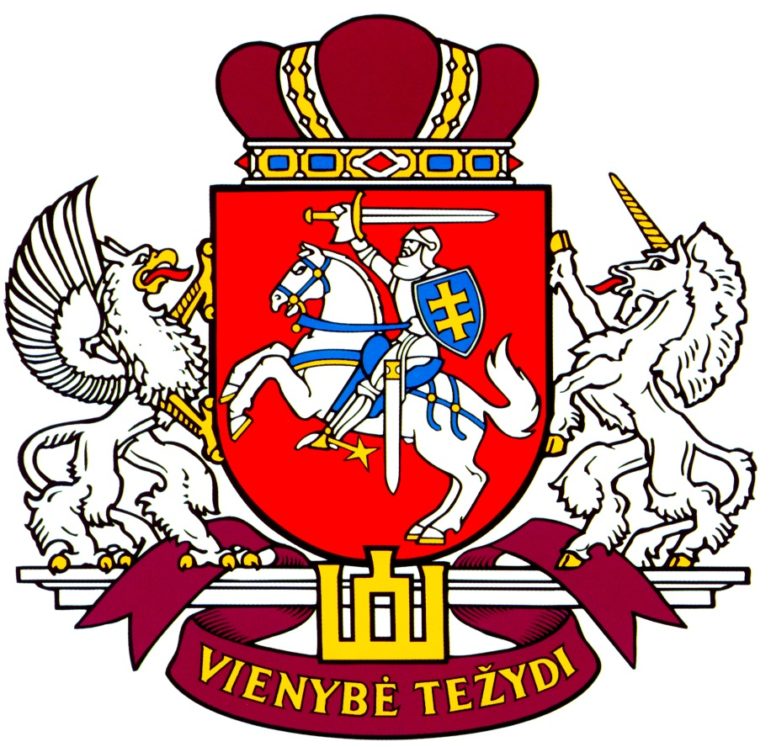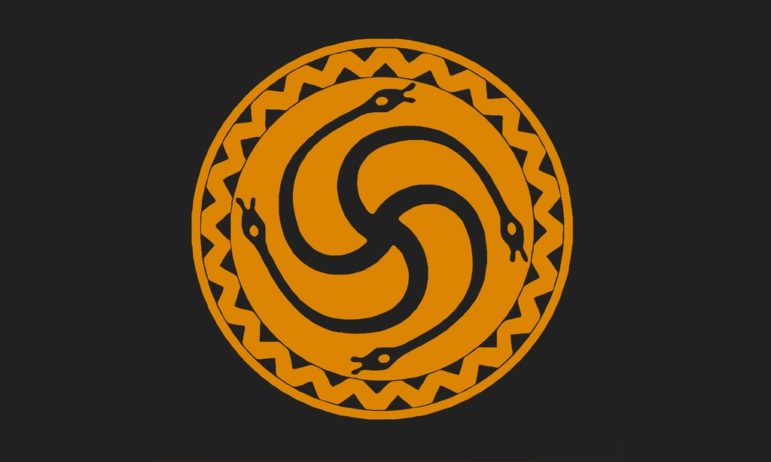VILNIUS, Lithuania – Last week, the Lithuanian Parliament, the Seimas, rejected the recognition of Romuva, the reconstructed and revived indigenous faith of Lithuania. In the vote on Thursday June 27, 2019, 31 lawmakers voted against recognizing Romuva of which 15 abstained.
While 40 lawmakers voted in favor of recognition, the vote still fell short. Reports say it was welcomed with applause in the Seimas.

Coat of arms of the Seimas of Lithuania
Initially, reports from Vilnius suggested that Romuva would be welcomed as a recognized religion with 46 members of the Seimas voting in favor. Robertas Šarknickas, of the Lithuanian Farmers and Greens Union, and Member of the Seimas said, “I am thrilled to vote for freedom. We often talk about freedom in this room, but often do something different. [We should] Leave people free to decide for themselves, especially since the community Romuva has proven to the public for almost 30 years that it is completely harmless and, on the contrary, nurtures ethnic traditions.”
Conservatives stated they respected Romuva while also talking about the faith mockingly. One conservative Member of Seimas noted, while reportedly smirking, that practitioners of Romuva believe in Perkūnas and his powers. Perkūnas is a central deity in Baltic religion with dominion over the sky, thunder, lightning, storms, rain, fire, war, law, order, fertility, mountains, and oak trees.
Still the Lithuanian Ministry of Justice stated that Romuva has a “significant role in Lithuania’s cultural and religious life by promoting ethnic culture.”

Romuva Flag – Image credit: DiegoAma – WikiCommons
Hours before the final vote, the Catholic Church of Lithuania predictably added its opposition to the recognition of Romuva.
Archbishop Gintaras Grušas, chairman of the Lithuanian Bishops’ Conference responded to the initial supportive vote with a letter detailing opposition to Romuva’s recognition.
In the letter, the Archbishop states, “From an historical-scientific point of view, the term ‘ancient Baltic religious community’ is used in an inadequate context… the term ‘ancient Baltic religious community’ is historically-scientifically meaningless, unreasonable, and therefore misleading.”
The Archbishop further adds that procedural issues limit the Lithuanian state from recognizing Romuva. He claims that while religious communities may apply for recognition after at least 25 years of existence that Romuva’s religious activity does not precede 2001.
The Archbishop added that “other (non-traditional) religious communities may be State recognized… if they are supported by the public and their training and rites are not in conflict with laws and morality.” He added, “the so-called ancient Baltic religious community Romuva – articulated views that are insufficient to be treated as a coherent and complete training.”
The Archbishop’s final point was the Romuva had insufficient numbers of practitioners to be recognized legally under Lithuanian law. “In the 2001 population census, only 1270 (0.04%) and in the 2011 census only 0.17% of the Lithuanian population attributed themselves to the ‘Baltic Faith,'” he said. According to the Archbishop, the results of the census only shows Lithuanians identifying with one or another religious aspect of “neo-agnosticism.”
According to the 2011 census 77% of the population reports as Catholic with smaller groups of various denominations and faiths including Orthodox Christians, Lutherans, other Protestants, Jews and Muslims as well as, of course, indigenous faiths.
Though with a different purpose, results were somewhat different in the 2010 Eurobarometer Poll on Biotechnology where 47% of Lithuanians responded that “they believe there is a God,” while 37% answered that “they believe there is some sort of spirit or life force,” and 12% said that “they do not believe there is any sort of spirit, god, or life force.”
Currently, besides the nine state-recognized and Seimas-sanctioned traditional religious communities that receive exclusive rights and state funding, there are 4 non-traditional religious communities recognized by the Seimas: Baptists, Adventists, Pentecostals, and the New Apostolic Church. All other religious communities, regardless whether they are officially registered, are considered as “non-state recognized.”
Condemnation following the vote was quick. “We regret this happened because we meet all the requirements under law to be recognized by the state as a religious community, and we believe that the Seimas violates [our] human rights in this way,“ said Inija Trinkūnienė, High Priestess in the Romuva community.
“Recognition would have been the respectful recognition of the faith of our ancestors… I believe that it is a matter of honor and dignity for every Lithuanian to maintain this faith. I regret that many Seimas members do not understand this,” said Trinkuniene.

European Congress of Ethnic Religions logo
The European Congress of Ethnic Religions (ECER) also responded. Andras Corban-Arthen who currently serves as Congress president issued their statement:
As president of the European Congress of Ethnic Religions (ECER), I would like to condemn, in the strongest possible terms, the unwillingness of the Lithuanian Parliament (Seimas) to recognize Romuva as an official religion in Lithuania. Romuva has fulfilled all the requirements to qualify for such a designation — it is a rapidly growing religion, whose members have creditably represented their homeland all over the world. Moreover, Romuva stands as one of the few remaining examples of the survival of European indigenous religions and cultures.
The decision by the Seimas, under strong pressure from the Roman Catholic church, represents not only a gross violation of the Lithuanian Constitution, but also contravenes important treaties and agreements such as the Charter of Fundamental Rights of the European Union and the United Nations’ Universal Declaration of Human Rights.
This has been a long and ongoing process. The leadership of Romuva has been actively pursuing their right to be recognized as a religion in Lithuania for almost three decades. The ECER and other NGOs, both in Europe and abroad, have officially expressed our support. I have personally met twice with Lithuanian government officials in an effort to convince them to approve Romuva’s petition. The Parliament of the World’s Religions has also sent letters of support, as have indigenous leaders and elders from various parts of the world. But — despite the incontrovertible agreements establishing religious freedom of choice and expression, and separation of church and state throughout most of Europe — the sad reality is that government officials in many countries still bow down to the dictates of mainstream religions, even if it means breaking or ignoring their own laws.
In the 21st century, no government should have the right to officially recognize some religions, and not others. Freedom of religion should apply to all religions equally, period. The ECER affirms our support of Romuva, and we will stand in solidarity with our Lithuanian sisters and brothers in any further efforts to bring this matter before such bodies as the European Court of Human Rights in Strasbourg, the United Nations Human Rights Council in Geneva, and the UN’s Permanent Forum on Indigenous Issues in New York. We invite all peoples of good conscience to join us in these efforts.
Had Romuva been recognized by the Lithuanian state, it would have received various rights including being able to receive tax credits for real property, social insurance coverage for its clergy, and legal recognition of marriages performed by its clergy.
Trinkūnienė said the Romuva community will begin considering its various options, including appealing to the European Court of Human Rights.
The Wild Hunt will continue to follow this story.
The Wild Hunt is not responsible for links to external content.
To join a conversation on this post:
Visit our The Wild Hunt subreddit! Point your favorite browser to https://www.reddit.com/r/The_Wild_Hunt_News/, then click “JOIN”. Make sure to click the bell, too, to be notified of new articles posted to our subreddit.
Pingback: Pagan & Shinto News: Lithuanian Parliament Won’t Recognise Romuva Pagan Religion – Fair Press